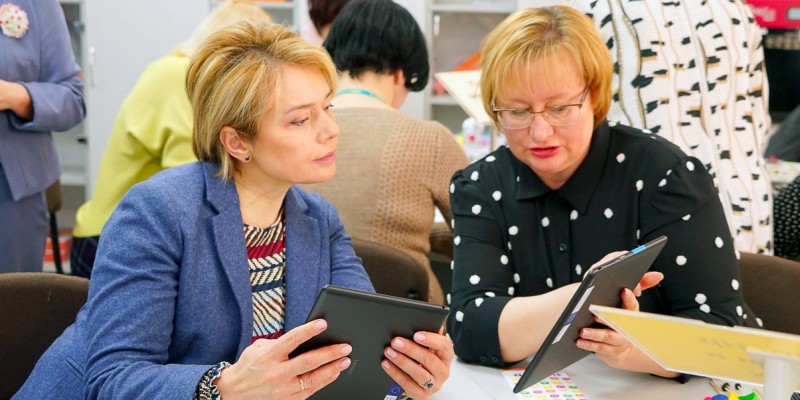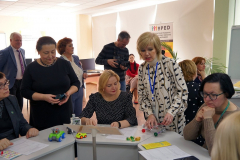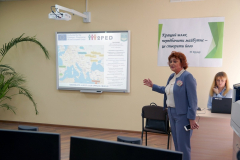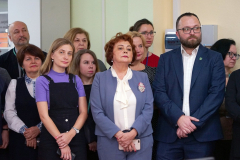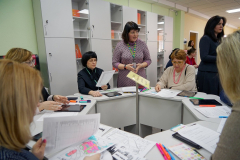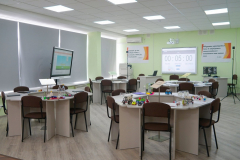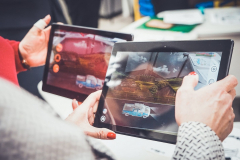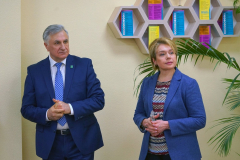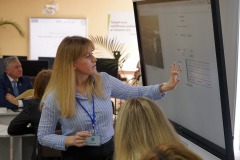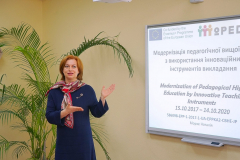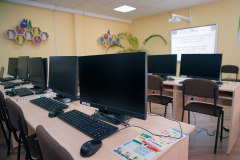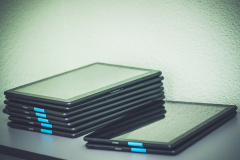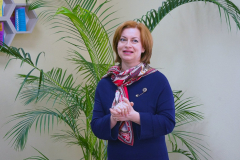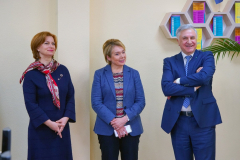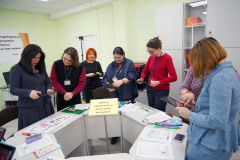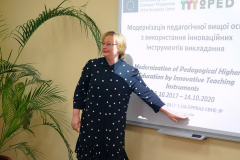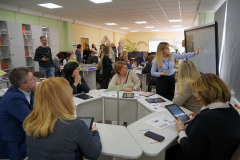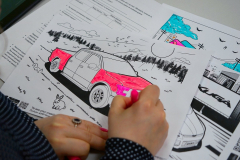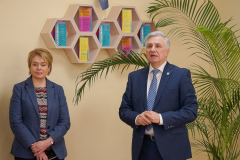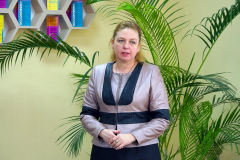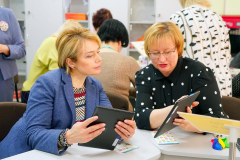On March 13, 2020, a presentation of the Center for Innovative Educational Technologies (ICR) was held at the Borys Grinchenko Kyiv University, which, according to Viktor Ogneviuk – Doctor of Philosophy, Professor, Full Member of the National Academy of Pedagogical Sciences of Ukraine, Rector of Borys Grinchenko Kyiv University, not every European University can be proud of.
Within the framework of the international project “Modernization of Pedagogical Higher Education by Innovative Teaching Instruments” (MoPED) of the EU program Erasmus + KA2 – Development of Higher Education Capacity, No. 586098-EPP-1-2017-1-UA-EPPKA2-CBHE-JP Borys Grinchenko Kyiv University received equipment, worth 40 thousand euros, to create an ICR.
At the Presentation of the Center spoke: Viktor Ogneviuk, Rector of Borys Grinchenko Kyiv University, Starostenko Hanna, Deputy Head of Kyiv City State Administration, Chairman of the Supervisory Board of the University; Olena Fidanian, Director of the Department of Education and Science of the city; Liliia Hrynevych, Vice-rector for scientific-pedagogical and international activity of Borys Grinchenko Kyiv University; Svetlana Shitikova, Director of National Erasmus + Office in Ukraine; Nataliia Morze, Professor of Department of Computer Science and Mathematics of the Faculty of Information Technology and Management, Doctor of Pedagogical Sciences, Corresponding Member of National Academy of Pedagogical Sciences of Ukraine, MoPED Project Manager of Borys Grinchenko Kyiv University; Olga Kotenko, the Director of the Pedagogical Institute.
Within the framework of the event, the participants of the academic group of the MoPED project (Nataliia Morze, Mariia Boiko, Viktoriia Vember, Liliia Varchenko-Trotsenko, Svitlana Vasylenko, Anastasiia Tiutiunnyk) developed the scenario (authors Nataliia Morze, Mariia Boiko) and lead a modern master class “The car on the balloon” using Rotary Stations (Learning Spaces) and Implementing Project-Based Learning and Inquiry-Based Learning in Integrated STEAM Primary Schooling. The purpose of the workshop was to demonstrate the acquired computer equipment based on the application of innovative teaching methods and technologies. The following study spaces were used in the scenario (rotating learning stations): maker, cooperation and collaboration, virtual labs, augmented and virtual reality, robot programming, and teacher collaboration.
In the space of using virtual laboratories and ILS (Inquiry Learning Space), participants were studying the concept of “movement” and its properties. Guests used tablets and a multimedia screen to scan QR codes; access to file-sharing; passing tests with real-time results display using formative evaluation; work in a remote laboratory to perform vehicle braking experiments and a remote laboratory (air pipe) to study the behaviour of vehicles in high winds. Participants were able to formulate a hypothesis, manage experiments, and discuss research findings. Space moderator Mariia Boiko demonstrated the ability to create Inquiry Learning Spaces (ILS) in the Go-lab ecosystem and the features of their use.
In the space of virtual and augmented reality, the participants together with the moderator Svitlana Vasylenko, using tablets with the augmented reality program installed on them, transformed the picture of moving cars, showing certain qualities. The participants explored the abilities of cars, their purpose and some aspects of road safety. With the use of goggles and virtual reality controllers, it was possible to dive into the space of a spaceship and even “go” into open space. Resources for the journey into virtual reality were prepared by Borys Grinchenko Kyiv University PHD student Dmytro Horbatovskyi.
Moderator of the collaboration and cooperation space Liliia Varchenko-Trotsenko organized collaborative activity of participants using tablets and interactive flipchart – SMART. As workbooks, students used the OneNote notebook (which consisted of two work sections – theoretical materials and practical tasks for student collaboration), for brainstorm and collaboration participants used an interactive flipchart, the main feature of which was the ability to transform information, written in a regular marker, into digital form, for further sharing by all moderators connected from the tablet, that is, transfer messages from connected student boards on a flip chart and back.
In the Maker space, participants were asked to explore hand-made machines and other engines with different types of mechanisms that move them, and discover their properties – the distance they can overcome, time and speed. Maker space moderator Viktoriia Vember also demonstrated a variety of handy tools from which students can make their own models of cars using a balloon to study the effects of jet power. Specifically, to make such a car, the parts were modelled on a computer and printed on a 3D printer. Further, students can use the Makeblock robot constructors to make machines and program their movements.
In the space of presentation of project results and cooperation with the teacher, moderator Nataliia Morze summed up the workshops, describing the modern pedagogical technologies and digital tools that were used during its implementation. In order to evaluate the results of the workshop, a BYOD (Bring Your Own Device) survey was proposed using participants’ own smartphones, which demonstrated that the event participants would promote the presented technologies and methods for training and high interest in activities at different rotation stations.
The project coordinator at Borys Grinchenko Kyiv University, Nataliia Morze in her speech outlined the objectives of the MoPED project, which have already been successfully implemented, those that will be implemented, emphasized the recognized scientific status of the project, as well as the possibilities of an open innovation educational center as an ecosystem, sustainable development of the results obtained, that the Kyiv City and Ukraine can use to modernize the curricula for future primary school teachers.
